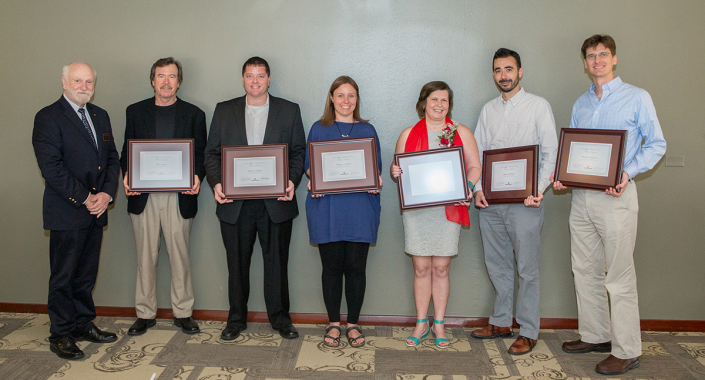Six Texas A&M faculty members named Arts & Humanities Fellows

Six Texas A&M faculty members accept awards as 2015 Arts & Humanities Fellows. From left: Glen A. Laine, vice president for research, who presented the awards; Peter Lieuwen, professor of performance studies and composer-in-residence; Galen D. Newman, assistant professor of landscape architecture and urban planning; Kristan A. Poirot, assistant professor of communications and Women’s Gender Studies Program; Olga Dror, associate professor of history; Brian Rouleau, assistant professor of history; and Daniel L. Schwartz, assistant professor of history. (Photo by Michael Kellett)
Six faculty members at Texas A&M University received 2015 Arts & Humanities Fellows’ awards during a lunch ceremony held on May 5 at the University Club. Each fellowship includes $15,000 in funding over three years to support a specific scholarly or creative project.
A peer-review panel selected the recipients based on five criteria: merit and originality, professional qualifications, clarity, benefit to the public and the quality of the overall presentation. Application was open to all tenured or tenure-track Texas A&M faculty who are engaged in scholarship in the humanities or in creative work in the arts.
Vice President for Research Glen A. Laine said, “The Arts & Humanities Fellows Program recognizes extraordinary scholarship and creativity, provides our faculty with a supportive environment to advance their scholarship and creative work and rewards scholarly and artistic merit among Texas A&M’s outstanding faculty-researchers.”
Arts & Humanities Fellowships for 2015 went to the following:
Olga Dror, associate professor of history in the College of Liberal Arts, is the author of the 2007 book “Cult, Culture, and Authority: Princess Lieu Hanh in Vietnamese History,” and the editor and translator of two volumes on Vietnamese and Chinese religions. Her most recent work focused on the experience of Vietnamese civilians caught in the Battle of Huế during the 1968 Tet Offensive. For her Arts & Humanities Fellowship project, Dror plans to complete a book titled “Raising Vietnamese: Youth Identities in North and South Vietnam During the War (1965-1975),” a comparative analysis of how Vietnamese on both sides of the conflict shaped the identities of their youth.
Peter Lieuwen, a professor of performance studies and composer-in-residence in the College of Liberal Arts, creates symphonic and chamber music the New York Times has hailed as “an attractive array of shimmering, shuddering sonorities.” His work has been commissioned, performed and recorded by orchestras, small ensembles and artists throughout North America and Europe. For his Arts & Humanities Fellowship project, Lieuwen will compose, perform and record two new orchestral works: “Concerto for Chamber Ensemble and Orchestra” and “Chamber Concerto.” The project will involve interaction and collaboration with professional musicians from Austria, Brazil, Germany, Slovakia and the United States.
Galen D. Newman, assistant professor of landscape architecture and urban planning in the College of Architecture, conducts research into human settlement, urban decline/regeneration, urban design and advanced digital representation. Much of his work focuses on theories, formation, measurements and regeneration of vacant land and abandoned structures. His Arts & Humanities Fellowship project, “Smart Shrinkage: Design for the Un-developing Landscape,” will address a problem facing hundreds of urban areas: how to manage declines in urban populations. The project will explore the unique urban design and landscape characteristics of heavily depopulated urban neighborhoods; use the Land Transformation Model, a GIS-based land-use prediction tool, to predict future vacancy; and develop an urban design strategy in response to those conditions.
Kristan A. Poirot, assistant professor of communications and Women’s Gender Studies Program in the College of Liberal Arts, studies the rhetoric from and about social movements rooted in race and gender. Her 2014 book, “A Question of Sex,” stands at the intersection of feminist rhetorical history and contemporary feminist theory and demonstrates that contemporary theories about sex, gender, identity and difference compel a rethinking of how we understand feminist movements and their public discourse and protests. Her Arts & Humanities Fellowship project, “Gendered Landscapes of Memory: Rhetoric, Place, and Black Freedom,” will build on work in tourism studies, cultural geography, rhetoric, history and gender studies with the goal of better understanding the concepts that inform the public’s collective memory as “gendered landscapes.”
Brian Rouleau, assistant professor of history in the College of Liberal Arts, concentrates on the nineteenth century history of the United States. His 2014 book, “With Sails Whitening Every Sea: Mariners and the Making of an American Maritime Empire,” examines encounters between US sailors and people overseas during the nineteenth century. For his Arts & Humanities Fellowship, Rouleau will conduct research for a book tentatively titled “Empire’s Children: Youth Culture and the Long Nineteenth Century’s Expansionist Impulse,” which will investigate the ways in which children became central to imperialism in North America, Africa and Australia. The Oxford University Press has expressed interest in the project.
Daniel L. Schwartz, assistant professor of history in the College of Liberal Arts, specializes in late Roman history, with a focus on culture, religion and education. His forthcoming projects include an edited volume on conversion to Christianity and Islam during Late Antiquity and an article on religious violence in fifth and sixth century Roman Syria. Of particular interest to him is Syriac, a dialect of Aramaic that flourished among Middle Eastern Christians, but which is generally neglected by today’s ancient and medieval scholars. For his Arts & Humanities Fellowship, Schwartz will develop a digital publication called SPEAR: Syriac Persons, Events and Relations, to advance the study of Syriac.

